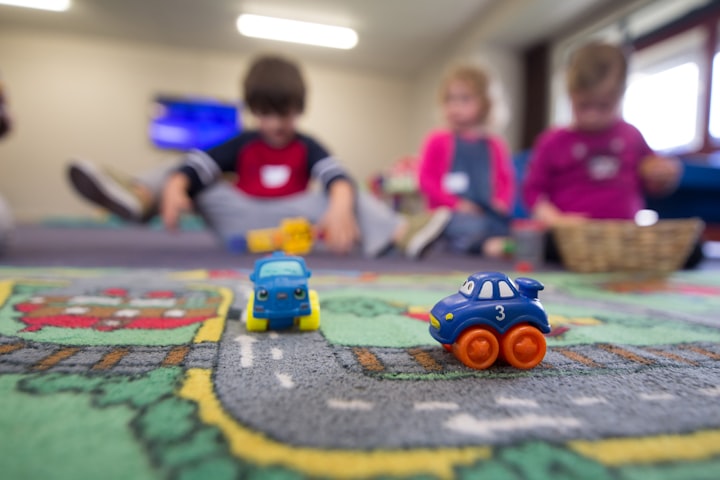10 Benefits of Preschool Education for Early Childhood Development
Preschool Education

Preschool education plays a vital role in shaping the early childhood development of children. It provides a strong foundation for their future academic, social, and emotional growth. The benefits of preschool education are far-reaching and can have a lasting impact on a child's life. London Kids Preschool in Ludhiana is a place where dreams take flight. Their dedicated teachers develop curiosity, critical thinking, and collaboration skills in each child.
In this article, we will explore ten compelling reasons why preschool education is essential for early childhood development.
1. Cognitive Development
Preschool education stimulates cognitive development in young children. It provides an environment where they can engage in various activities that enhance their critical thinking, problem-solving, and decision-making skills. Through structured play and interactive learning experiences, children develop their cognitive abilities, laying the groundwork for future academic success.
2. Socialization
Preschool offers children the opportunity to interact with their peers in a structured setting. It helps them develop social skills, such as sharing, taking turns, and cooperating with others. Through collaborative play and group activities, children learn valuable lessons in communication, empathy, and teamwork. These socialization skills are crucial for building positive relationships and navigating the social complexities of later life.
3. Emotional Development
Preschool provides a nurturing environment where children can explore and express their emotions. Through art, music, and storytelling, they learn to identify and manage their feelings effectively. Preschool teachers also play a pivotal role in teaching emotional intelligence, helping children develop empathy, resilience, and self-regulation skills. These emotional competencies lay the foundation for positive mental health and well-being throughout their lives.
4. Language and Literacy Skills
During the preschool years, children's language skills undergo significant development. Preschool education focuses on expanding their vocabulary, improving their communication abilities, and fostering a love for reading and writing. Through interactive storytelling, phonics exercises, and language-rich activities, children develop strong language and literacy skills, setting them on the path to becoming proficient readers and communicators.

5. Fine and Gross Motor Skills
Preschool provides ample opportunities for children to develop their fine and gross motor skills. Engaging in activities such as drawing, painting, playing with manipulative toys, and outdoor play enhances their hand-eye coordination, balance, and overall physical dexterity. These skills are essential for future tasks, such as writing, sports participation, and other physical activities.
6. Independence and Self-confidence
Preschool education fosters independence and self-confidence in young children. By encouraging them to make choices, solve problems, and complete tasks independently, preschool helps children develop a sense of autonomy and self-reliance. This early boost in confidence sets the stage for their future academic and personal endeavors, empowering them to take on challenges with resilience and determination.
7. Creativity and Imagination
Preschool provides a nurturing environment that nurtures children's creativity and imagination. Through various art forms, pretend play, and open-ended activities, children can explore their creative potential and develop their imaginative thinking. This creativity is a valuable asset that allows them to approach problem-solving in innovative ways and fosters a lifelong love for artistic expression.
8. Cultural Awareness and Diversity
Preschool education promotes cultural awareness and celebrates diversity. By exposing children to different cultures, traditions, and perspectives, preschool fosters an appreciation for diversity and inclusion from an early age. It helps children develop respect, empathy, and a global mindset, preparing them to thrive in a multicultural society.
9. Preparation for School
Attending preschool equips children with the necessary skills and readiness to transition smoothly into formal schooling. Preschool education introduces them to routines, structure, and academic concepts, laying the foundation for a successful educational journey. By familiarizing children with the school environment, preschool helps reduce anxiety and ensures a seamless transition to kindergarten and beyond.
10. Long-term Academic Success
Numerous studies have shown a positive correlation between preschool education and long-term academic success. The skills and knowledge acquired during the preschool years provide children with a solid academic foundation, setting them up for future achievements. Children who attend preschool often demonstrate higher levels of school readiness, better academic performance, and increased chances of pursuing higher education.
In conclusion, preschool education offers numerous benefits for early childhood development. It nurtures cognitive, social, emotional, and physical growth while fostering essential skills and characteristics that contribute to long-term success. By providing a stimulating and supportive learning environment, preschool plays a crucial role in shaping the trajectory of a child's life.
About the Creator
Vikash Kumar
Hello, I am an SEO executive and blogger and I share my content about education, technology, governments, travel, etc.






Comments
There are no comments for this story
Be the first to respond and start the conversation.